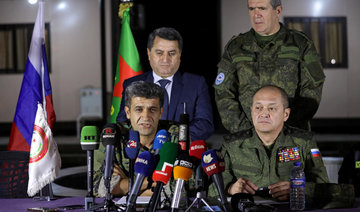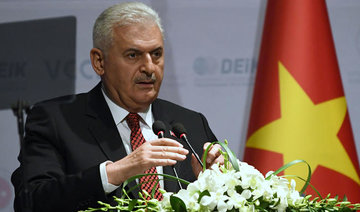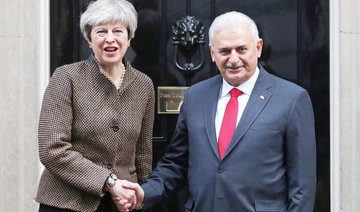ANKARA: Turkey’s top security body, the National Security Council (MGK), on Tuesday recommended that the government deploy forces around Syria’s Kurdish-held Afrin canton and in western Aleppo.
The MGK emphasized Turkey’s determination to secure its borders against terrorist groups. Afrin is controlled by the US-backed Kurdish People’s Protection Units (YPG), which Ankara views as the Syrian affiliate of the outlawed Kurdistan Workers’ Party (PKK).
On Monday, Turkish Defense Minister Nurettin Canikli hinted at a possible operation in Afrin, saying such an operation “may be tomorrow or... sooner than tomorrow.”
Last week, he said the PKK/YPG presence in Afrin poses a “serious danger and threat that should be removed in line with Turkey’s rights arising from international law.”
The Turkish military recently completed the formation of its third observation post in Syria’s northwest Idlib province, as part of a cease-fire co-guaranteed with Russia and Iran.
Earlier this month, Turkish President Recep Tayyip Erdogan said his country needed to clear Afrin of the YPG after accomplishing its military operation in Idlib.
But Serhat Erkmen, a Middle East expert at the Ankara-based 21st Century Turkey Institute, told Arab News: “Following the agreement reached in Sochi last week between Moscow, Tehran and Ankara, a comprehensive military operation that would escalate regional tension is unlikely.”
He added: “Even if it took place, it wouldn’t be a military operation that changes the balance power fundamentally, at a time when the Syrian conflict is evolving toward a political settlement.”
Turkey’s Operation Euphrates Shield in northern Syria last year was conducted after getting the green light from Moscow.
Any move on Afrin, where Russian military observers were deployed this summer, would also need its approval.
“Ankara should reach an agreement with Moscow over who will control Afrin if the PKK/YPG are removed from the region: The Syrian regime or the Free Syrian Army (FSA), which is backed by Turkey? It’s the key question,” Erkmen said. “Turkey won’t feel secure so long as the PKK is in Afrin.”
But the risks of such an operation may be prohibitively high, he added. “First of all, there’s a military risk. The PKK has been preparing for a possible Turkish operation for a while.”
Erkmen said: “One shouldn’t forget the political risks as well. We don’t know how the Syrian government will react.”
He added: “If the perceived security threat is bigger than the current risk, decision-makers will take into consideration the dynamics not only of Syria but the whole region.”
Bora Bayraktar, a Middle East expert from Istanbul Kultur University, told Arab News: “The operation will be mostly a continuation of Turkey’s military engagement in the Idlib de-escalation zone.”
“The region will be contained by moving as close as possible to Aleppo and the town of Tal Rifat,” he said.
“Fifty-five percent of Afrin’s population are Arabs, Kurds make up 30-35 percent, and the rest are Turkmen. With the stability that would be brought by a possible Turkish operation, the return of displaced populations may restore the original demography and neutralize the PKK/YPG presence.”
If Syrian-Kurdish forces resist the Turkish operation, Ankara may use aerial attacks and shelling without launching a ground operation with its troops, Bayraktar said.
Turkey hints at imminent Afrin operation
Turkey hints at imminent Afrin operation

‘Barefoot with nothing’: War-displaced Sudanese go hungry in refuge town

TAWILA: Crouching over a small wood-scrap fire in Sudan’s war-battered Darfur region, Aziza Ismail Idris stirs a pot of watery porridge — the only food her family have had for days.
“No organization has come. No water, no food — not even a biscuit for the children,” Idris told AFP, her voice brittle with fatigue.
Having fled a brutal paramilitary attack last month on Zamzam, once one of Sudan’s largest displacement camps, she and her five children are among the estimated 300,000 people who have since arrived in the small farming town of Tawila, according to the United Nations.
“We arrived here barefoot with nothing,” she said, recalling her escape from Zamzam camp, about a 60-kilometer (37-mile) desert trek away, also in the vast western region of Darfur.
The few aid organizations on the ground lack the means to meet the urgent needs of so many displaced people.
“Humanitarian organizations were simply not prepared to receive this scale of displacement,” said Thibault Fendler, who works with medical charity Doctors Without Borders (MSF) in Tawila.
Since war broke out in April 2023 between Sudan’s army and rival paramilitaries, the town has received waves of displaced people fleeing violence elsewhere.
“We are working to scale up our capacities, but the needs are simply enormous,” Fendler told AFP.
Tawila, nestled between mountains and seasonal farmland, was once a quiet rural outpost.
But the two-year war pitting the army against the paramilitary Rapid Support Forces (RSF) has buffeted the already-scarred Darfur region.
Entire displacement camps have been besieged and razed, while the armed group that controls the area around Tawila — a faction of the Sudan Liberation Movement, led by Abdelwahid Al-Nur — has vowed to protect those fleeing the violence.
The town’s schools, mosques and markets are crammed with people sleeping side by side, on concrete floors, under trees or in huts of straw and plastic, exposed to temperatures that can reach 40 degrees Celsius (104 Fahrenheit).
Beyond the town center, a patchwork of makeshift shelters fans out across the horizon.
Inside, families keep what little they managed to bring with them: worn bags, cooking pots or clothes folded carefully on mats laid over dry earth.
Some weary children play silently in the dirt — many malnourished, some dressed in oversized hand-me-downs, others in the clothes they had fled in.
Nearby, dozens of women line up with empty jerrycans, waiting by a lone water tank.
More queues snake around soup kitchens, with women carrying pots in hand and children on their hips, hoping to get a meal before they run out.
“When we arrived, the thirst had nearly killed us, we had nothing,” said Hawaa Hassan Mohamed, a mother who fled from North Darfur’s besieged state capital of El-Fasher.
“People shared what little they had,” she told AFP.
The war has created the world’s largest hunger crisis, with famine already declared in several parts of North Darfur state where the UN estimates that more than a million people are on the brink of starvation.
The RSF and the army continue to battle for control of territory, particularly in and around El-Fasher — the last army stronghold in Darfur — crippling humanitarian access.
“It takes a long time to get aid here. The roads are full of checkpoints. Some are completely cut off,” Noah Taylor, head of operations for the Norwegian Refugee Council, told AFP from Tawila.
“There are so many gaps in every sector, from food to shelter to sanitation. The financial and in-kind resources we have are simply not sufficient,” he said.
Organizations are scrambling to get food, clean water and health assistance to desperate families, but Taylor said these efforts are just scratching the surface.
“We are not there yet in terms of what people need,” he said.
“We’re doing what we can, but the global response has not kept pace with the scale of this disaster.”
Leni Kinzli, head of communications at the World Food Programme, said that a one-time delivery of “1,600 metric tons of food and nutrition supplies” for 335,000 people had reached Tawila last month.
But it took two weeks to reach the town, navigating multiple checkpoints and unsafe roads, she told AFP.
Aid workers warn that without urgent funding and secure access, these deliveries will even be harder, especially with the rainy season approaching.
Fierce clashes erupt in Libyan capital

- Officials released no information on potential casualties or injuries
- Residents urged to stay indoors
TRIPOLI: Violent clashes between rival armed groups erupted Monday night in the Libyan capital Tripoli, prompting the interior ministry to urge residents to stay indoors.
Heavy arms fire and explosions were heard in several areas of the capital from 9:00 p.m. (1900 GMT), AFP journalists in the city said.
Officials released no information on potential casualties or injuries.
The interior ministry of the national unity government in Tripoli in a statement urged “all citizens to stay at home for their safety.”
Local media said clashes broke out in the southern suburbs between armed groups from Tripoli and rivals from Misrata, a major port city 200 km (125 miles) east of the capital.
Libya is struggling to recover from years of unrest following a 2011 revolt that led to the fall of the late dictator Muammar Qaddafi.
It is currently divided between a UN-recognized government in Tripoli and a rival administration in the east, controlled by the Haftar family.
Despite relative calm in recent years, clashes periodically break out between armed groups vying for territory.
In August 2023, fighting between two powerful armed groups in Tripoli left 55 dead.
Several districts of the capital and its suburbs announced that schools would be closed on Tuesday until further notice.
Earlier Monday, the United Nations Support Mission in Libya and the United States Embassy in Tripoli called for calm.
They urged “all parties to de-escalate” and “refrain from any provocation, to resolve disputes through dialogue.”
Israel’s West Bank land registration is a tool for annexation, NGO says

RAMALLAH: An Israeli rights group has denounced a government decision to launch extensive land registration for parts of the occupied West Bank, saying it could help advance annexation of the Palestinian territory.
“It is a tool for annexation,” said Yonatan Mizrachi of the Settlement Watch project at Israeli nongovernmental organization Peace Now.
The West Bank, which Israel has occupied since 1967, has no comprehensive land registry, with some areas unregistered or residents holding deeds from before the Israeli occupation.
The Israeli security Cabinet on Sunday decided to initiate a land registration process in the West Bank’s Area C, which covers more than 60 percent of the territory and is under full Israeli control.
Though the process would likely take “years” according to Mizrachi, he said that Palestinians in Area C could lose land if Israeli authorities do not accept their claim to it.
This might lead to “a massive land theft,” Peace Now said, adding that the process could result “in the transfer of ownership of the vast majority of Area C to the (Israeli) state.”
“The Palestinians will have no practical way to realize their ownership rights,” the anti-settlement group said.
Some Israeli ministers have advocated the annexation of the West Bank, home to around 3 million Palestinians as well as some 500,000 Israelis living in settlements that are illegal under international law.
Finance Minister Bezalel Smotrich, a far-right politician who lives in a settlement, has said that 2025 would be the year Israel extends its sovereignty over parts of the West Bank.
To Mizrachi, the government’s decision was primarily “about ... the places where they want to expand settlements,” including in areas considered state land.
He mentioned remarks by Defense Minister Israel Katz, who praised the move in the official statement announcing it.
Katz said that launching land registration “is a revolutionary decision that brings justice to Jewish settlement in Judea and Samaria,” the biblical name that the Israeli government uses to refer to the West Bank.
The process will lead to the “strengthening, establishment and expansion” of settlements, Katz was quoted as saying.
He also said it would block “attempts to seize land” by the Palestinian Authority, which exercises limited self-rule in parts of the West Bank but not Area C.
Mohammed Abu Al-Rob, director of the Palestinian Authority’s communication center, said that the decision was “a dangerous escalation of Israel’s illegal policies aimed at entrenching its occupation and advancing de facto annexation.”
Area C is “an inseparable part” of the rest of the Palestinian territories, he said.
Abu Al-Rob called on the international community to “reject this unlawful decision and to take immediate, concrete action to thwart its implementation.”
Syria warns Kurds against delay in integrating into state

- Foreign Minister Asaad Al-Shaibani emphasizes that ‘our goal is not dominance but unification’
ANKARA: Syrian Foreign Minister Asaad Al-Shaibani has warned that postponing the implementation of an agreement between Syria’s new administration and Kurdish-led forces in the northeast would “prolong the chaos” in the country.
His remarks came as the Kurdistan Workers’ Party, or PKK, announced it was disbanding, an announcement the Kurdish-led Syrian Democratic Forces, which control swaths of north and northeast Syria, have not yet commented on.
The PKK’s move is “a pivotal moment” for regional stability, Al-Shaibani told a news conference in Ankara with his Turkish and Jordanian counterparts.
Syria is “implementing the national accord with the Syrian Democratic Forces and incorporating all areas under central state control,” he said.
In March, Syria’s President Ahmad Al-Sharaa and SDF chief Mazloum Abdi signed an agreement to integrate the civil and military institutions of the autonomous Kurdish administration in the northeast into the national government.
The deal, agreed three months after the overthrow of President Bashar Assad, is expected to be implemented by the end of the year.
“This process is complicated and sensitive, but it is necessary,” Al-Shaibani said, adding that “delaying the implementation of this agreement will prolong the chaos, open the door to foreign interference, and fuel separatist tendencies.”
“Our goal is not dominance but unification,” he said.
“We are keen on implementing this agreement, and we hope that the other side is seriously committed to implementing this agreement,” he added.
The SDF, the Kurdish administration’s de facto army, controls most of the oil and gas fields in Syria. The force maintains that it is independent from the PKK, but it is dominated by the Kurdish People’s Protection Units, or YPG, which Ankara views as a PKK offshoot.
After years of marginalization and repression under the Assad dynasty, the Kurds took advantage of the government forces’ withdrawal during the civil war, which erupted in 2011, to establish a semi-autonomous administration.
With US backing, the SDF played a key role in the fight against Daesh, which was defeated in its last Syrian territorial stronghold in 2019.
Al-Shaibani emphasized that “the unity of Syrian territory is non-negotiable, as Syria is an indivisible, unified state, sovereign over its land and will remain so.”
“The rights of Kurdish citizens will be preserved and guaranteed on an equal footing with the rest of the Syrian people,” he added.
Syria’s Kurds have criticized a temporary constitutional declaration announced in March and said the new government failed to reflect the country’s diversity.
In February, Abdi said an initial call for the PKK to lay down weapons and disband did not concern his forces.
Jordanian and Saudi army chiefs reaffirm military partnership

- Saudi Arabia is at the forefront of efforts to enhance regional security, says Jordanian commander
- His counterpart from the Kingdom reaffirms Riyadh’s commitment to tackling regional threats
LONDON: During talks on Monday, Maj. Gen. Yousef Ahmed Al-Hunaiti, chairperson of the Joint Chiefs of Staff of the Jordanian Armed Forces, and his Saudi counterpart, Gen. Fayyadh Al-Ruwaili, discussed military cooperation between their countries.
They considered ways in which cooperation might be enhanced and expertise shared, and addressed the development of strategic defense partnerships and coordinated efforts to tackle regional and international security challenges.
Al-Hunaiti reaffirmed the strong ties between the nations’ armed forces, and said that Saudi Arabia is at the forefront of efforts to enhance regional security, the Jordan News Agency reported.
Al-Ruwaili praised collaborative efforts to strengthen defense and security initiatives, and reaffirmed Riyadh’s commitment to tackling regional threats.
They were joined during their meeting at the Saudi Armed Forces headquarters in Riyadh by several senior officers from both countries.























